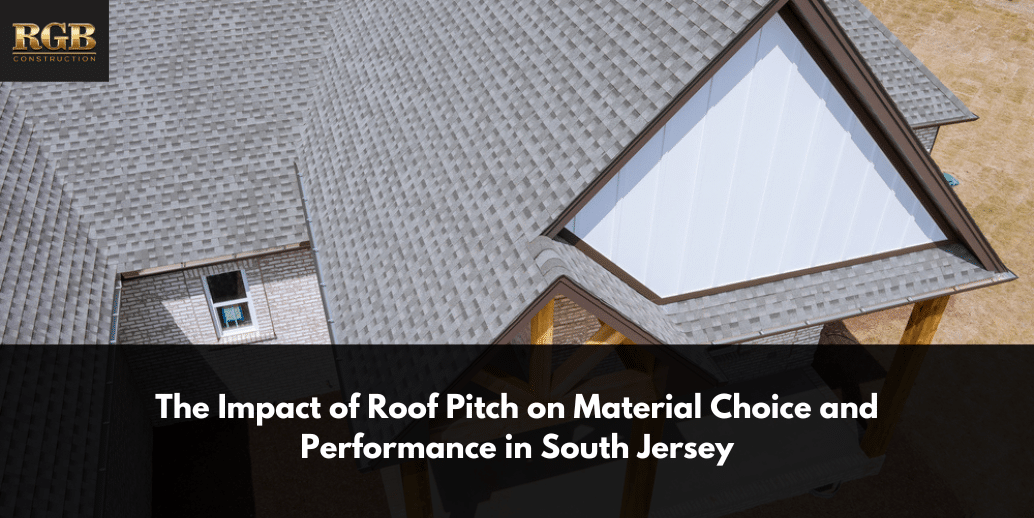When it comes to roofing, one material does not fit all. In South Jersey, the unique climate conditions require careful consideration of roof pitch—the slope of the roof—to determine the most suitable materials and ensure optimal performance. Roof pitch affects various factors, including water runoff, wind resistance, and the roof’s ability to handle snow and ice. Understanding these aspects helps homeowners and builders make informed decisions that enhance the durability and efficiency of their roofing systems.
Key Takeaways
- Roof pitch, measured as the ratio of vertical rise to horizontal run, influences the choice of roofing materials and their performance.
- Steep-slope roofs (pitch > 4/12) are ideal for materials like asphalt shingles, slate, and tile, which offer good water runoff and weather resistance.
- Low-slope roofs (pitch < 4/12) require durable, waterproof materials like modified bitumen, built-up roofing (BUR), and single-ply membranes (EPDM, TPO, PVC).
- Steep-slope roofs are better suited for handling snow, ice, and strong winds, while low-slope roofs need effective waterproofing and secure fastening systems.
- Proper material selection, installation, and maintenance are crucial for maximizing the roof’s durability, weather resistance, and energy efficiency in South Jersey.
Understanding Roof Pitch
Roof pitch is measured as the ratio of vertical rise to horizontal run. For instance, a roof with a 4/12 pitch rises 4 inches for every 12 inches of horizontal distance. Roofs are generally classified into two categories based on their pitch:
- Steep-Slope Roofs: These roofs have a pitch greater than 4/12 and are commonly found in residential buildings. They are designed to facilitate quick water runoff, which is beneficial in regions with significant rainfall.
- Low-Slope Roofs: These roofs have a pitch less than 4/12 and are often seen in commercial buildings. They require materials that can handle pooling water and provide effective waterproofing.
Best Materials for Steep-Slope Roofs
Due to the slope of some roofs, there are materials that are better suited for such a slope. Let’s take a look at the best materials for roofing with steeper slopes, such as those with spires or other sharp architectural elements:
Asphalt Shingles
Asphalt shingles are a popular choice for steep-slope roofs due to their affordability and ease of installation. They are suitable for pitches above 4/12, offering good water runoff and weather resistance. However, regular maintenance is essential to ensure their longevity.
Slate and Tile
Slate and tile roofs are known for their durability and aesthetic appeal. They are ideal for steep slopes, effectively shedding water and resisting fire. Despite their higher initial cost and weight, which requires a strong roof structure, these materials offer long-term benefits and minimal maintenance.
Best Materials for Low-Slope Roofs
Due to the nature of low-slope roofing, shingles and shakes are not ideal. For low-slope roofing, waterproof membranes are often recommended by roofers. Here are some of the best materials:
Modified Bitumen
Modified bitumen roofing is durable and flexible, with strong waterproofing properties. It is suitable for low-slope applications, providing robust protection against leaks. Professional installation is crucial to ensure its effectiveness.
Built-Up Roofing (BUR)
Built-up roofing consists of multiple layers, offering excellent protection and insulation. It is effective for flat or low-slope roofs, providing good durability and weather resistance. However, BUR is heavier and may require more maintenance compared to other materials.
Single-Ply Membranes (EPDM, TPO, PVC)
Single-ply membranes are lightweight, flexible, and easy to install. They are effective for low-slope roofs, offering good resistance to weather and UV rays. Proper installation is key to preventing leaks and ensuring long-term performance.
Performance Considerations With Various Materials in South Jersey
Now, how do steep roofs perform compared to low slope roofs and vice versa? For those who live in South Jersey, how a roof handles various weather patterns is important. Knowing how said materials also handle such weather helps you make the correct decisions when getting new roofing installed.
Here are some performance considerations to keep in mind:
- Water Runoff: Steep-slope roofs facilitate quick water runoff, reducing the risk of leaks and water damage. In contrast, low-slope roofs require effective waterproofing and drainage solutions to manage heavy rainfall.
- Snow and Ice: Steep-slope roofs prevent snow accumulation, reducing the risk of ice dams and structural stress. Low-slope roofs must be capable of handling snow loads and need proper insulation to prevent ice formation.
- Wind Resistance: Steep-slope roofs offer better resistance to strong winds, which is crucial in hurricane-prone areas like South Jersey. Low-slope roofs are more susceptible to wind uplift, requiring secure fastening systems.
- Energy Efficiency: Steep-slope roofs typically provide better ventilation, reducing heat buildup in attics. Low-slope roofs are suitable for solar panels and green roofing systems, enhancing energy efficiency.
Contact a South Jersey Roofing Contractor Today to Learn More
In South Jersey, the roof pitch significantly influences the choice of roofing materials and their performance. By understanding the specific needs and challenges associated with different pitches, homeowners and builders can select the right materials to ensure durability, weather resistance, and overall effectiveness of the roofing system. Whether dealing with steep or low slopes, it’s crucial to consider local climate conditions and ensure proper installation and maintenance to maximize the roof’s lifespan and performance.
RGB Construction is a top-rated roofing contractor in South Jersey. Our team is available for both residential and commercial projects. Please contact us for a free estimate for your roofing project today.







